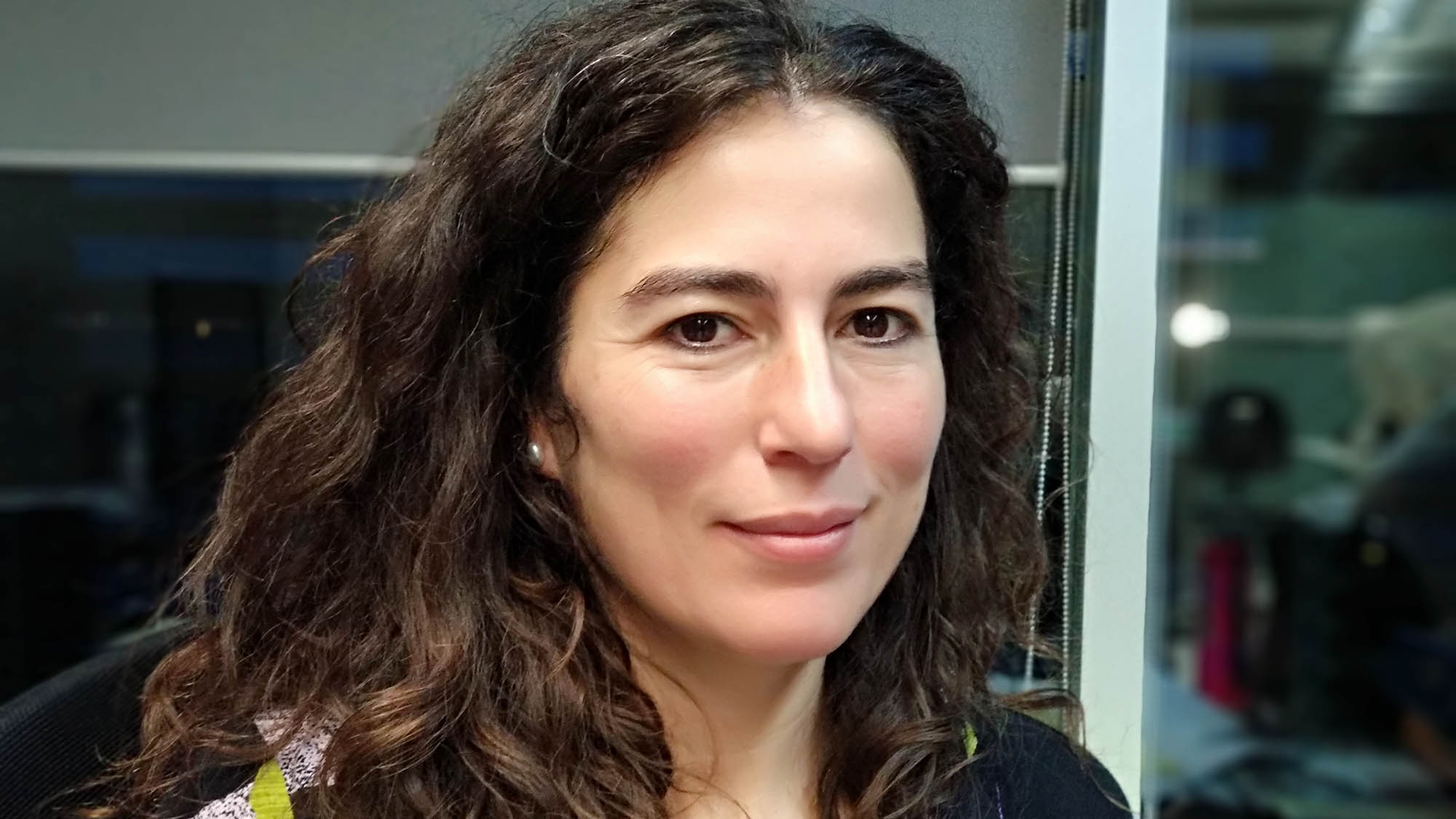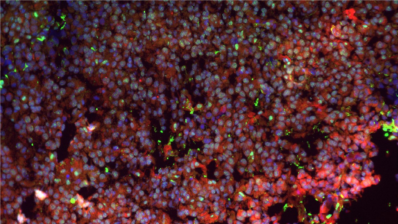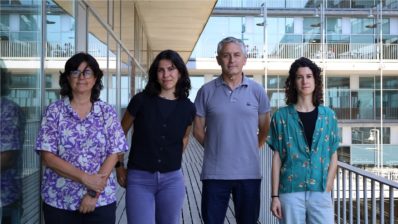Pilar Rivera, born in Sevilla, is a pharmacist, but after 14 years in Germany she went back to Spain and created her nanomedicine research group, which she heads at the Department of Experimental and Health Sciences, Pompeu Fabra University (DCEXS- UPF), in the Biomedical Research Park of Barcelona (PRBB), since 2016.With two children 3 and 6 years old, she likes scuba diving, gardening and culture. She tells us about her scientific career.
What did you study?
I studied pharmacy with speciality in clinics. As I was finishing my degree, I went to Germany to do an internship, after having done some training hours in a hospital in Seville already.
Why in Germany?
I wanted to go abroad, among other things, because I was already thinking about doing research, but in Seville they gave very few scholarships and it was common to do the thesis without payment… Also, I wanted to learn German. There was no Erasmus for the internships, and no institutional support, so I searched for the internships on my own. I called all pharmacies in every major German city, and ended up in Berlin.
And did you learn German?
I had no choice! The pharmacist forbade us to speak Spanish or English. I signed up for a language academy, but mostly it was a total hands-on dive. I had to answer the phone and did not understand a word! I was 24 years old. I stayed an entire year; I did many more hours than I was supposed to… And then they hired me.
While working there, I began to think about returning to Spain. But I got a scholarship to do a stay at a pharmacology institute in Berlin, and then another to do my PhD. So I stayed.
14 years…
Yes! I started my PhD in 2003 in molecular pharmacology and cell signaling, despite my many language limitations. I finished in 2007. Then I thought again about returning to Spain.
I was interested in the topic of pharmacovigilance, so I tried to get into this field. I did several interviews but found that people here thought that if I had a doctorate, I would have to stay at university… I would say the PhD kept me from getting a job outside of academia in Spain.
Another reason to stay in Germany?
In Germany, a PhD is considered a tool, a training that gives you capabilities. It does not restrict you to stay in the university. Many people at the end of their doctorate went to industry, patents, regulatory agencies. In any case, while looking for my place in the world, I ended up doing a postdoctoral stay in another field: in physics, in a group that worked in biophotonics.
In Germany, a PhD is considered a tool, a training that gives you capabilities. It does not restrict you to stay in the university.
How does a pharmacist interested in pharmacovigilance end up working on biophotonics ?
Well, one of those coincidences of life! A friend knew someone in this group, and he told me that there was a job offer. In the lab they were all physicists. They where synthesizing materials that they wanted to apply in medicine, and they needed someone with biological knowledge.
Setting up a biology lab was my first task; all protocols, cell treatments, microscopic techniques, etc. to study the interaction of various types of nanoparticles that the group synthesized with biological systems.
So this was your first contact with nanomedicine.
I came in contact with many types of nanoparticles, of different materials, sizes, properties … and with all kinds of cells as well. This helped me learn how to predict which type of nanomaterial is most appropriate for each biological application. This is a very important topic, because I realized that the physico-chemical properties of particles, when interacting with biological material, can completely change their functionality. And this is the line of research that I follow now in my group.
“I learned to predict which type of nanomaterial is most appropriate based on what biological application”
During the postdoc I did my “Habilitation”, the highest degree a German university can give, where you have to show research and teaching skills, because I was thinking of staying in Germany. As a woman, under 40, and with qualifications, there were a number of programs that would help me set up my own lab … They are more advanced there in gender parity issues!
But, in the end, you came home …
Yes, although I was very disconnected from Spain, the idea of returning was always there, around my head … I was told that the ‘most decent’ way to come back was with a Ramón y Cajal scholarship, so I decided to go for one last try, and I applied. Finally, for personal reasons (I became pregnant) I came to Spain with a contract at the Barcelona Institute of Materials Science (ICMAB-CSIC) in March 2013, before knowing whether I had been awarded the scholarship. Luckily, I was immediately awarded the Ramón and Cajal! In October I gave birth and applied for a postponement of the scholarship. I joined the laboratory again in February 2014 with my Ramón i Cajal, in a research institute in Tarragona where they did a technique that I was interested in learning.
How did you end up at the UPF?
I lived in Barcelona, and traveled every day to Tarragona … Talking to people here, I learned about the Tenure Track UPF program. I applied and they selected me in 2016. But I was pregnant again! I gave birth in May and I returned in September, this time finally to set up my own lab.
Does being a mum penalize you as a researcher?
Research is always hard work, 365 days a year. But it depends on your personal ability, and what you want. Each one lives with their own circumstances. I couldn’t be just a mother; I like what I do, and I want to do it, that’s why I’ve managed to do it. Of course, maternity leave was hard because I had to write projects… But still, I am in favor of maternity leave being longer, at least 6 months!
“Research is hard work, 365 days a year, and everyone experiences it under their own circumstances. I like what I do, and I want to do it, that’s why I’ve managed to do it”
In any case, congratulations… Challenge completed!
Well, I’m not so sure! I have 2 more years of the tenure track, with all the evaluations in between. It is a very new system, I was the second to get the Tenure Track at the DCEXS-UPF. Then came Marc Güell, Oriol Arpí, Ana Janic. The current situation is not easy, and it can be demotivating; a lot of work and a lot of pressure, poorly paid, poorly recognized and unstable.
Uh! Not very motivating …
But the work is exciting! I enjoy it, otherwise I wouldn’t do it. And I’m really happy to be at the UPF. Its vision of teaching, research, and integration of innovation is similar to the view I learned in Germany, closer to the European view.
So, would you recommend doing research?
Knowledge is generated at the university. Everything that will happen in society, here you know about it beforehand, you are always a step ahead. What for the rest of the world will be tomorrow’s news, you know about today at the university, and that’s awesome.
“Knowledge is generated at the university; here you learn today about tomorrow’s news”
I particularly like the fact that, at least here at the UPF, innovation is being strongly encouraged, that the results of the research reach society and that they can be applied. This is what we try to do in my group.







